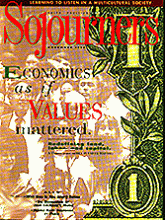The sight of Yasir Arafat and Yitzhak Rabin shaking hands over a peace accord between their peoples evokes prophetic images. Swords into plowshares; spears into pruning hooks; preparing for war no more; above all, the dead, dry bones of peace prospects taking on sinew, flesh, and spirit. Standing together in the sunshine of a late summer morning in Washington, D.C., the old antagonists, Arafat and Rabin, symbolized the unexpected, the unimaginable, the unbelievable that only God's Spirit can ultimately effect in human affairs.
This, then, must be our first and most important word on the accords between the Israelis and Palestinians: a jubilant recalling of God's promise of peace affected in ways that defy prediction. The Creator has done it again--an unlikely, some would have said impossible, reconciliation of seemingly irreconcilable nationalistic claims.
Two other comments seem to have gotten lost in the reams of material written and spoken about the agreements. Not many observers highlighted the fact that all of the principals in this historic peace accord came to Washington, D.C., to make it official. However, one pundit who did--Charles Krauthammer--put it in these disturbing words: "Anyone who doubts that Washington is the center of the universe has not been paying attention." The idea of Rabin, Arafat, Peres, Abbas, and a host of others trooping halfway around the world for the blessing of an American president gives us pause.
Read the Full Article

